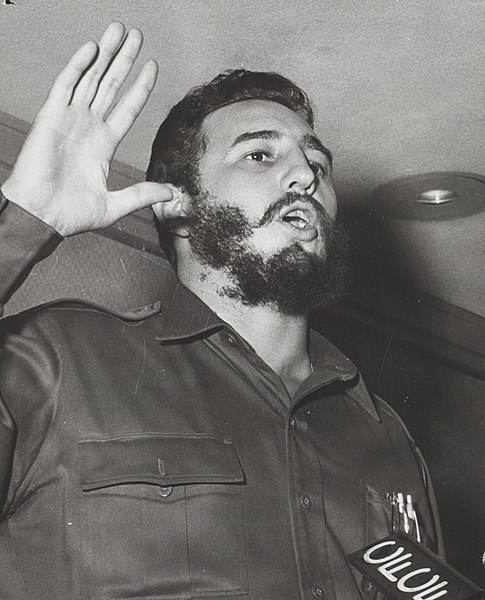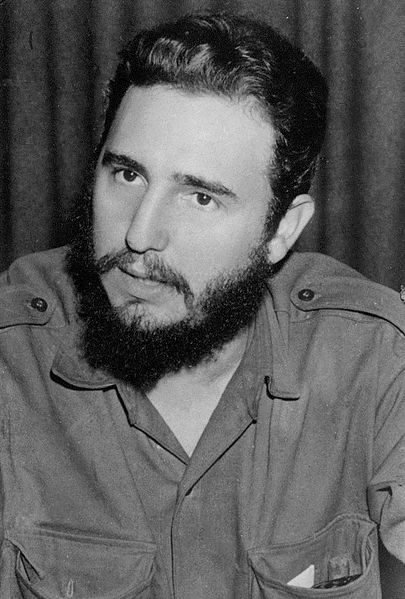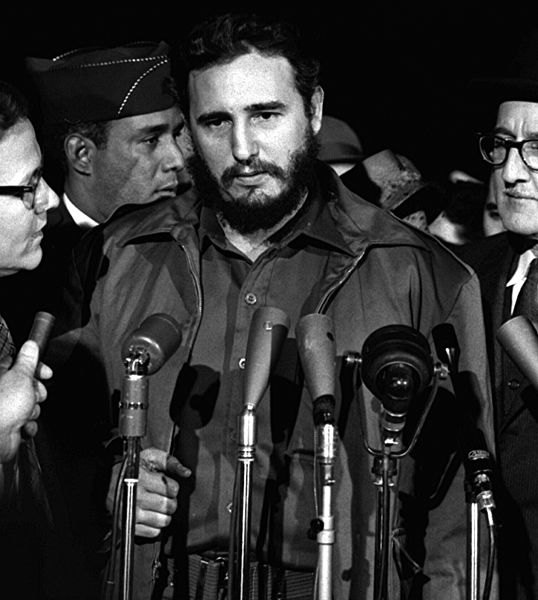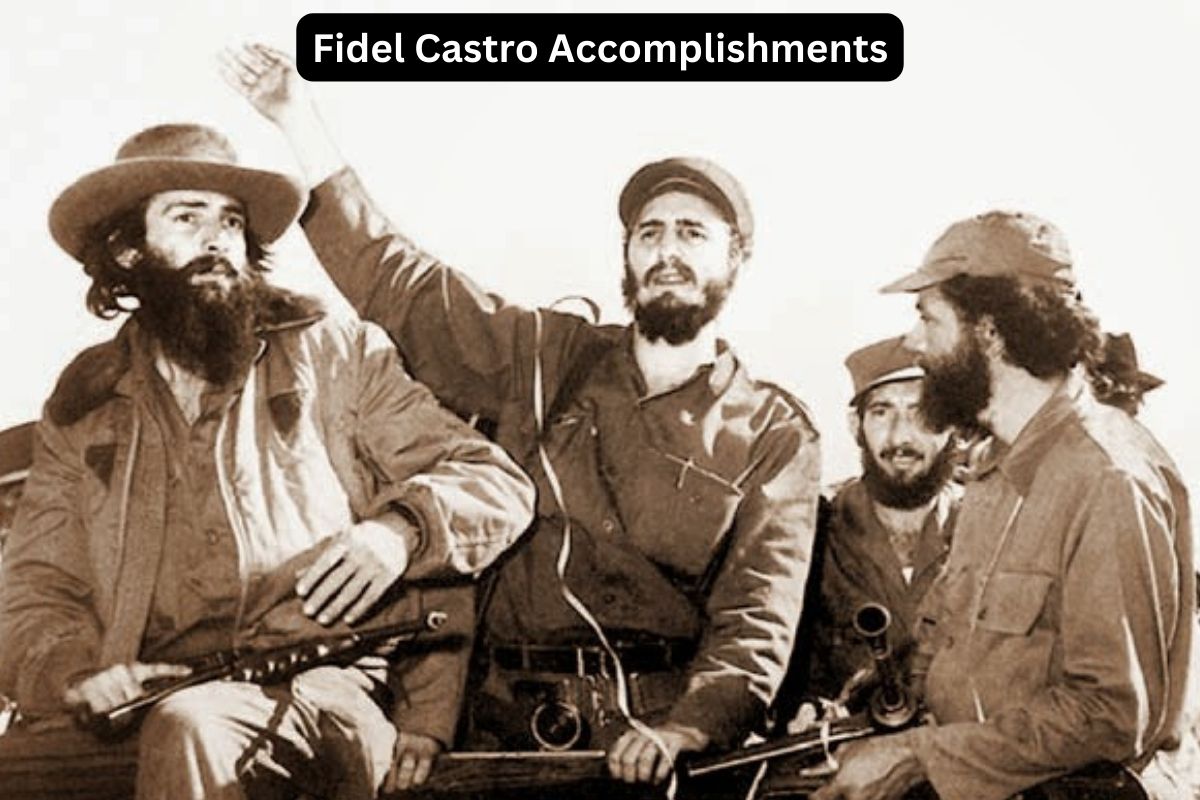Fidel Castro, the central figure of the Cuban Revolution, continues to evoke mixed reactions, with supporters lauding his socialist policies while critics decry his authoritarianism.
In this article, we examine Castro’s complex legacy, highlighting his achievements such as healthcare and education reforms, as well as his confrontations with the United States and support for global anti-imperialist movements.
Despite these accomplishments, his leadership is also marked by criticisms of political repression and economic hardships. Through a balanced analysis, we aim to provide insight into Castro’s enduring impact on Cuba and the world.
Accomplishments of Fidel Castro
1. Cuban Revolution (1959)
Fidel Castro led the Cuban Revolution, a successful armed uprising against the dictatorship of Fulgencio Batista.
This revolution, which began in the Sierra Maestra mountains in 1956 and culminated in Batista’s overthrow on January 1, 1959, marked a significant turning point in Cuban history.
It brought an end to Batista’s authoritarian regime and established a socialist government under Castro’s leadership.

2. Nationalization of industries
After coming to power, Castro’s government embarked on a series of nationalization initiatives aimed at redistributing wealth and resources in Cuba. Key industries such as sugar, mining, and utilities were brought under state control.
Also Read: Facts About Fidel Castro
This move was intended to break the dominance of foreign-owned corporations and local elites, ensuring that the benefits of these industries were shared among the Cuban people.
3. Literacy campaign
One of Castro’s early priorities was to address Cuba’s high levels of illiteracy. In 1961, his government launched a nationwide literacy campaign known as the “Literacy Campaign” (La Campaña Nacional de Alfabetización).
This initiative mobilized hundreds of thousands of volunteers, including students and young professionals, to teach reading and writing skills to illiterate Cubans in rural areas.
Also Read: Timeline of Fidel Castro
The campaign was highly successful, dramatically increasing literacy rates from around 60-76% to over 96% within a year. It not only provided basic education to millions of Cubans but also empowered communities and fostered a sense of solidarity and national pride.
4. Healthcare system
Under Fidel Castro’s leadership, Cuba developed a comprehensive healthcare system that aimed to provide free medical care to all citizens. This system focused on preventive care, community-based healthcare, and universal access to essential services.
Cuba trained a large number of doctors and healthcare professionals, both for domestic needs and to support medical missions abroad.
The healthcare system achieved notable successes, including high life expectancy, low infant mortality rates, and the development of innovative medical treatments and research, despite facing resource constraints due to the U.S. embargo.

5. Land reform
Fidel Castro implemented land reforms as part of his broader agrarian reform program. These reforms aimed to address social inequalities and promote agricultural productivity by redistributing land from large landowners, including foreign corporations, to peasants and small farmers.
The government granted land to cooperative farms and state farms, encouraging collective ownership and cooperative management. Land reform sought to break up the concentration of land ownership, increase land access for rural workers, and promote agricultural diversification and food self-sufficiency.
6. Support for decolonization movements
Castro’s Cuba actively supported decolonization movements in Africa, Asia, and Latin America, aligning itself with anti-colonial and anti-imperialist struggles worldwide. Cuba provided political, military, and humanitarian assistance to revolutionary movements fighting against colonial powers and oppressive regimes.
For example, Cuba supported the African National Congress (ANC) in South Africa’s struggle against apartheid and provided military aid to liberation movements in Angola, Mozambique, and Guinea-Bissau.
Castro’s government also supported socialist governments and leftist movements in Latin America, fostering solidarity and cooperation among nations challenging Western dominance and capitalist exploitation.

7. Resistance against U.S. influence
Fidel Castro’s government fiercely resisted U.S. influence in Latin America, positioning Cuba as a symbol of anti-imperialism and a bulwark against American hegemony in the region.
This resistance was manifested in various ways, including diplomatic confrontations, ideological battles, and support for revolutionary movements opposed to U.S.-backed regimes.
Cuba’s defiance challenged U.S. foreign policy objectives and contributed to tensions between the two countries, leading to the imposition of economic sanctions and diplomatic isolation by the United States.
8. Survival of U.S. economic embargo
Despite facing a comprehensive economic embargo imposed by the United States since the early 1960s, Fidel Castro’s government managed to sustain its socialist system and maintain political stability for decades.
The embargo, which included restrictions on trade, investment, and travel, aimed to isolate Cuba economically and undermine its socialist experiment.
However, Cuba adapted to the challenges posed by the embargo through state-led economic planning, rationing, diversification of trade partners, and reliance on subsidies from socialist allies such as the Soviet Union.
The survival of the embargo demonstrated Cuba’s resilience and defiance in the face of external pressures.
9. International solidarity and humanitarian aid
Fidel Castro’s Cuba pursued a policy of international solidarity, offering humanitarian aid, medical assistance, and educational support to countries in need, especially in the developing world.
Cuban doctors, teachers, and other professionals were deployed to various countries to provide assistance in areas such as healthcare, education, and disaster relief.
Cuba’s international solidarity efforts earned it recognition and gratitude from recipient nations, bolstering its influence and soft power on the global stage.
10. Longevity in power (nearly five decades)
Fidel Castro’s tenure as Cuba’s leader, spanning nearly five decades from 1959 until he stepped down due to health reasons in 2008, is a remarkable accomplishment in itself.
Despite facing internal challenges, external threats, and changing geopolitical dynamics, Castro maintained political control and leadership continuity throughout his tenure.
His enduring influence shaped Cuba’s domestic policies, foreign relations, and revolutionary ethos, leaving a lasting legacy that continues to shape Cuban society and politics to this day.
